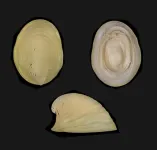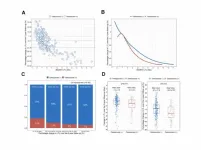(Press-News.org) Nicholas A. Marston, MD, MPH, of the TIMI Study Group and Carl J. and Ruth Shapiro Cardiovascular Center at Brigham and Women’s Hospital, is the corresponding author of a paper published in Nature Medicine, “Clonal hematopoiesis, cardiovascular events and treatment benefit in 63,700 individuals from five TIMI randomized trials.”
How would you summarize your study for a lay audience?
Clonal hematopoiesis of indeterminate potential (CHIP) is a condition that promotes the multiplication of blood stem cells in the body and increases the risk of heart disease and stroke in patients. It is caused by specific gene mutations that can occur as people age, often found in patients over 60 years old.
Our team analyzed data from 63,700 patients from five different clinical trials for heart disease treatments. Over a two-year period, we observed how many patients with and without CHIP had heart-related problems, such as heart attacks, strokes and heart-related procedures. We found that CHIP had the strongest association with first heart attack and was not associated with recurrent cardiac events. We also found that patients with CHIP benefit from a range of heart therapies to a similar degree as those without CHIP.
What knowledge gaps does your study help to fill?
There are two main knowledge gaps that are addressed in this analysis. The first is the question of which populations may benefit from knowing if they have CHIP mutations. We found that a primary prevention population, those without prior heart attacks, appear to have the strongest risk associated with CHIP. The presence of CHIP in those who have already have a heart attack appears to provide less information on risk. The second is whether there are any current cardiovascular therapies that could help to offset the excess risk associated with CHIP. We found that 4 commonly used heart medicines appear to work as well in patients with CHIP than without CHIP, with no outsized benefit seen in patients with CHIP.
How did you conduct your study?
We conducted a large-scale observational study using data from five large, randomized clinical trials from the TIMI Study Group to examine the impact of heart disease treatments on patients with CHIP. 63,700 patients with and without CHIP were included in the analysis and were followed for an average of 2.5 years.
At the conclusion of our observation, we found that 7,453 patients experienced at least one heart attack, stroke or procedure to restore blood flow to the heart. We also found patients with CHIP had a 30% higher risk of an initial heart attack, but no increased risk of repeated heart attacks.
What are the implications?
Our findings suggest that testing for CHIP may have greater utility in patients without prior heart attack than those with a prior heart attack. In this population, the presence of CHIP identifies a 30% increased risk that can be addressed with preventive medicines. Specifically, we found that existing heart therapies such as lipid-lowering medicine, an antiplatelet therapy, and a cardiometabolic/antiglycemic agent all appear to provide benefit in these patients.
What are the next steps?
Having focused primarily on ischemic events like heart attacks and strokes in this initial CHIP analysis, we look forward to studying the relationship with other cardiovascular disease types in this large clinical trial cohort. Other diseases of interest include heart failure, atrial fibrillation, and blood clots in the legs or lungs.
Authorship: In addition to Dr. Marston, additional Brigham and Women’s Hospital authors include Giorgio E. M. Melloni, Frederick Kamanu, Robert P. Giugliano, Benjamin M. Scirica, Stephen D. Wiviott, Eugene Braunwald, Peter Libby, Marc S. Sabatine and Christian T. Ruff
Paper cited: Martson, N et al. “Clonal hematopoiesis, cardiovascular events and treatment benefit in 63,700 individuals from five TIMI randomized trials.” Nature Medicine DOI: 10.1038/s41591-024-03188-z
END
Research spotlight: Analyzing the effectiveness of heart therapies and outcomes for patients with chip
Clonal hematopoiesis of indeterminate potential (CHIP) is a condition that promotes the multiplication of blood stem cells in the body and increases the risk of heart disease and stroke in patients.
2024-08-06
ELSE PRESS RELEASES FROM THIS DATE:
Soft gold enables connections between nerves and electronics
2024-08-06
Gold does not readily lend itself to being turned into long, thin threads. But researchers at Linköping University in Sweden have now managed to create gold nanowires and develop soft electrodes that can be connected to the nervous system. The electrodes are soft as nerves, stretchable and electrically conductive, and are projected to last for a long time in the body.
Some people have a “heart of gold”, so why not “nerves of gold”? In the future, it may be possible to use this precious metal in soft interfaces to connect electronics to the nervous system for medical ...
The race to discover biodiversity: 11 new marine species and a new platform for rapid species description
2024-08-06
Accelerating global change continues to threaten Earth’s vast biodiversity, including in the oceans, which remain largely unexplored. To date, only a small fraction of an estimated two million total living marine species have been named and described. A major challenge is the time it takes to scientifically describe and publish a new species, which is a crucial step in studying and protecting these species. The current scientific and publishing landscape often results in decade-long delays (20-40 years) from the discovery of a new species to its official description. As an ...
18th Annual Q-Bio Conference: Global scholars explore new Frontiers in quantitative biology
2024-08-06
The 18th Q-Bio Conference on Quantitative Biology was held at the Guangming Yungu International Conference Center in Shenzhen from July 26 to 29, 2024. Organized by the Shenzhen Institute of Advanced Technology (SIAT) of the Chinese Academy of Sciences (CAS), the Shenzhen Institute of Synthetic Biology (iSynBio), and Peking University, the conference drew over 230 global researchers from countries including the U.S., U.K., France, India, Japan, Chile, and China.
Themed "Predictive Modeling and Quantitative Principles in Complex Biological Systems," the event explored future prospects in quantitative and synthetic biology. Under ...
Eating more fruits & vegetables to reduce dietary acid lowers blood pressure and improves kidney and heart health in patients with hypertension
2024-08-06
Philadelphia, August 6, 2024 – Doctors recommend making fruits and vegetables a foundational part of the treatment of patients with hypertension. Diets high in fruits and vegetables are found to lower blood pressure, reduce cardiovascular risk, and improve kidney health due to their base-producing effects. A new study in The American Journal of Medicine, published by Elsevier, details the findings from a five-year interventional randomized control trial.
Despite ongoing efforts to improve hypertension treatment and reduce its adverse outcomes with pharmacological strategies, hypertension-related chronic kidney disease and its cardiovascular mortality are increasing. Heart disease ...
Rising toll of serious injuries linked to expanded Mexico-US border wall crossing
2024-08-06
The expansion of the Mexico-US border wall crossing has been accompanied by a rising toll of serious injuries, with poor discharge care and a lack of appropriate interpreting facilities adding up to a “humanitarian and health crisis,” suggest researchers in the open access journal Trauma Surgery & Acute Care Open.
Thirty eight different nationalities and 21 languages other than Spanish were represented among those attempting to cross one segment of the wall in 2021 and 2022, say the researchers.
The Mexico-US border wall was extended by 50 miles and raised to a height of 30 feet in Southern California, construction ...
Interplay of sex, marital status, education, race linked to 18 year US lifespan gap
2024-08-06
The interplay of a quartet of sex, marital status, education, and race is linked to an 18 year lifespan gap for US citizens, and while no one factor is more influential than any of the others, the more of these influential factors a person has, the higher their risk of an earlier death, finds research published in the open access journal BMJ Open.
But a simple scoring system based on these characteristics can help overcome this complexity to identify those most at risk, say the researchers.
Individual risks and genetic factors explain part of the differences in health and death, but the evidence increasingly points to the role of social determinants—the ...
Arizona State University research site designated UNESCO World Heritage Site
2024-08-05
At the edge of the south coast of South Africa, Arizona State University professor Curtis Marean and his research teams have been teasing out the secrets of our earliest modern human ancestors in caves at Pinnacle Point for over 25 years.
In late July, the site was declared a UNESCO World Heritage Site, the Olympic gold medal of heritage, which is only given to sites of “outstanding universal value” to all of humanity.
In 1999, while conducting reconnaissance on the south coast ...
Association between osteoporosis and telomere shortening
2024-08-05
“We sought to identify an association between osteoporosis and LTL shortening in an independent prospective cohort.”
BUFFALO, NY- August 5, 2024 – A new research paper was published on the cover of Aging (listed by MEDLINE/PubMed as "Aging (Albany NY)" and "Aging-US" by Web of Science) Volume 16, Issue 14, entitled, “Association between osteoporosis and the rate of telomere shortening.”
A shorter leukocyte telomere length (LTL) is reported to be associated with age-related diseases, including osteoporosis. Many studies ...
DRI’s STEM education team receives EPA grant to support microplastics education for Nevada students and communities
2024-08-05
Reno, Nev. (August 5, 2024) – DRI’s STEM Education Team has received a grant from the Environmental Protection Agency (EPA) to support environmental education in Nevada’s schools.
The $100,000 grant will fund the production of additional educational kits known as Greenboxes that raise awareness and understanding of the prevalence and role of microplastics in the environment.
“DRI is honored to be awarded this EPA grant, and we are eager to continue our outreach to underserved rural and urban communities across Nevada,” said DRI STEM Education Program Manager Emily McDonald-Williams. “Middle school students ...
Sex bias in pain management at emergency departments new study reveals
2024-08-05
New study reveals a significant sex bias in pain management at emergency departments, showing that female patients are consistently less likely to receive pain medication prescriptions compared to male patients with similar complaints. This bias persists across different ages, pain levels, and physician sex, indicating a systemic issue. Female patients' pain scores are less frequently recorded, and they spend more time in the emergency department than male patients. The findings highlight the need for urgent policy interventions and training for healthcare ...
LAST 30 PRESS RELEASES:
Fossil amber reveals the secret lives of Cretaceous ants
Predicting extreme rainfall through novel spatial modeling
The Lancet: First-ever in-utero stem cell therapy for fetal spina bifida repair is safe, study finds
Nanoplastics can interact with Salmonella to affect food safety, study shows
Eric Moore, M.D., elected to Mayo Clinic Board of Trustees
NYU named “research powerhouse” in new analysis
New polymer materials may offer breakthrough solution for hard-to-remove PFAS in water
Biochar can either curb or boost greenhouse gas emissions depending on soil conditions, new study finds
Nanobiochar emerges as a next generation solution for cleaner water, healthier soils, and resilient ecosystems
Study finds more parents saying ‘No’ to vitamin K, putting babies’ brains at risk
Scientists develop new gut health measure that tracks disease
Rice gene discovery could cut fertiliser use while protecting yields
Jumping ‘DNA parasites’ linked to early stages of tumour formation
Ultra-sensitive CAR T cells provide potential strategy to treat solid tumors
Early Neanderthal-Human interbreeding was strongly sex biased
North American bird declines are widespread and accelerating in agricultural hotspots
Researchers recommend strategies for improved genetic privacy legislation
How birds achieve sweet success
More sensitive cell therapy may be a HIT against solid cancers
Scientists map how aging reshapes cells across the entire mammalian body
Hotspots of accelerated bird decline linked to agricultural activity
How ancient attraction shaped the human genome
NJIT faculty named Senior Members of the National Academy of Inventors
App aids substance use recovery in vulnerable populations
College students nationwide received lifesaving education on sudden cardiac death
Oak Ridge National Laboratory launches the Next-Generation Data Centers Institute
Improved short-term sea level change predictions with better AI training
UAlbany researchers develop new laser technique to test mRNA-based therapeutics
New water-treatment system removes nitrogen, phosphorus from farm tile drainage
Major Canadian study finds strong link between cannabis, anxiety and depression
[Press-News.org] Research spotlight: Analyzing the effectiveness of heart therapies and outcomes for patients with chipClonal hematopoiesis of indeterminate potential (CHIP) is a condition that promotes the multiplication of blood stem cells in the body and increases the risk of heart disease and stroke in patients.





